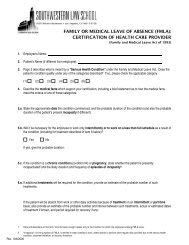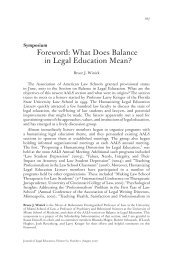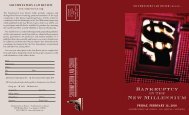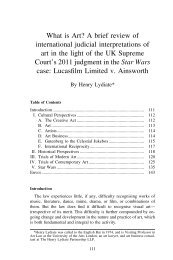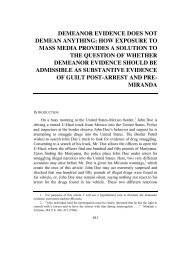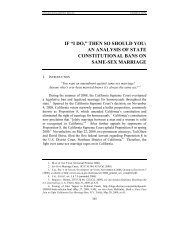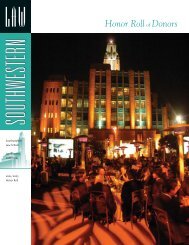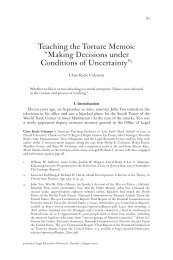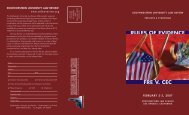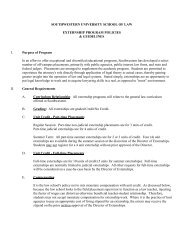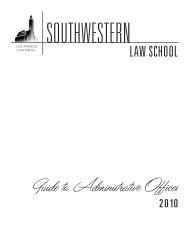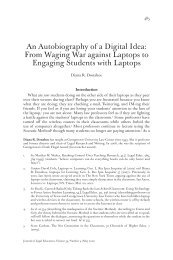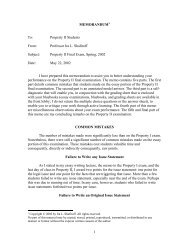Censoring the Censors in the WTO - Southwestern Law School
Censoring the Censors in the WTO - Southwestern Law School
Censoring the Censors in the WTO - Southwestern Law School
Create successful ePaper yourself
Turn your PDF publications into a flip-book with our unique Google optimized e-Paper software.
60 J. Int’l Media & Enterta<strong>in</strong>ment <strong>Law</strong> Vol. 3, No. 1<br />
Ch<strong>in</strong>ese authorities as be<strong>in</strong>g consistent with Ch<strong>in</strong>a’s public morals. 273<br />
Accord<strong>in</strong>g to <strong>the</strong> panel, Ch<strong>in</strong>a had not proven that <strong>the</strong> Ch<strong>in</strong>ese Government<br />
or Ch<strong>in</strong>ese-owned companies needed to import and distribute<br />
censor-approved U.S. media items <strong>in</strong> order to protect Ch<strong>in</strong>a’s public<br />
morals. 274 Of course, given that <strong>the</strong> items <strong>in</strong> question had already been<br />
approved for entry <strong>in</strong> Ch<strong>in</strong>a’s pre-importation content review program,<br />
<strong>the</strong> issue of whe<strong>the</strong>r <strong>the</strong> majority of Ch<strong>in</strong>a’ people actually support Ch<strong>in</strong>a’s<br />
<strong>the</strong> relevant prohibited content laws was not before <strong>the</strong> panel. On<br />
December 21, 2009, <strong>the</strong> Appellate Body ruled decisively <strong>in</strong> <strong>the</strong> U.S.’<br />
favor <strong>in</strong> this case, affirm<strong>in</strong>g <strong>the</strong> great majority of <strong>the</strong> panel’s f<strong>in</strong>d<strong>in</strong>gs<br />
<strong>in</strong> <strong>the</strong> U.S.’ favor and revers<strong>in</strong>g one of <strong>the</strong> few f<strong>in</strong>d<strong>in</strong>gs of <strong>the</strong> panel <strong>in</strong><br />
Ch<strong>in</strong>a’s favor. 275<br />
In any case, as <strong>in</strong>dicated above, with<strong>in</strong> <strong>the</strong> next few years, <strong>the</strong> Dispute<br />
Settlement Body of <strong>the</strong> <strong>WTO</strong> likely will be called upon to clarify at<br />
least clarify <strong>the</strong> mean<strong>in</strong>g of <strong>the</strong> public morals exception <strong>in</strong> future cases,<br />
and <strong>the</strong>se cases are likely to be highly controversial. After all, <strong>the</strong> <strong>WTO</strong><br />
rules <strong>the</strong>mselves do not directly concern or prohibit members’ suppression<br />
of political dissent or restriction of free speech 276 and a number of<br />
<strong>WTO</strong> members today 277 possess non-democratic forms of government.<br />
III. Previous Scholarship Regard<strong>in</strong>g<br />
<strong>the</strong> Public Morals Exception<br />
Stephen Charnovitz’ article The Moral Exception <strong>in</strong> Trade Policy ,<br />
278<br />
which was discussed above, was <strong>the</strong> first major article to address <strong>the</strong><br />
mean<strong>in</strong>g of <strong>the</strong> public morals exception to <strong>the</strong> GATT /<strong>WTO</strong> rules. In<br />
273. Ch<strong>in</strong>a—Media Panel Report, supra note 4, 8.1-8.4 passim.<br />
274. Id.<br />
275. U.S.—Media Appellate Body Report, supra note 4, at 412–17. Specifically,<br />
<strong>the</strong> Appellate Body reversed <strong>the</strong> panel’s f<strong>in</strong>d<strong>in</strong>g (set forth <strong>in</strong> paragraph 7.836 of <strong>the</strong><br />
panel’s report) that <strong>the</strong> State plan requirement <strong>in</strong> Article 42 of <strong>the</strong> Publications Regulation,<br />
which restricted <strong>the</strong> quantity, structure, and distribution of importation entities, is<br />
“apt to make a material contribution to <strong>the</strong> protection of public morals and that, <strong>in</strong> <strong>the</strong><br />
absence of a reasonably available alternative, it can be characterized as ‘necessary’ to<br />
protect public morals <strong>in</strong> Ch<strong>in</strong>a.” Id. 415 (b) (iii).<br />
276. See, e,g., Thomas Cottier, The Legitimacy of <strong>WTO</strong> <strong>Law</strong>, Swiss National Centre<br />
of Competence <strong>in</strong> Research, NCCR Trade Work<strong>in</strong>g Paper 2008/19, Nov. 2008, at 16,<br />
available at http://wti.nccr-trade.org/images/stories/publications/IP2/The_Legitimacy_<br />
of_<strong>WTO</strong>_<strong>Law</strong>_cottier_f<strong>in</strong>al%200808.pdf (accessed Dec. 31.2009) (comment<strong>in</strong>g that<br />
“<strong>WTO</strong> rules . . . are not designed to steer domestic processes of distributive justice.<br />
This is partly due to <strong>the</strong> limits of <strong>in</strong>ternational law, respect<strong>in</strong>g all forms of government<br />
alike.”).<br />
277. See list of 153 current members of <strong>the</strong> <strong>WTO</strong>. Understand<strong>in</strong>g <strong>the</strong> <strong>WTO</strong>: The Organization,<br />
Members and Observers, wto.org, available at http://www.wto.org/english/<br />
<strong>the</strong>wto_e/whatis_e/tif_e/org6_e.htm (accessed Dec. 31, 2009).<br />
278. Charnovitz, supra note 202.<br />
3058-088-3pass-02_Wright-r03.<strong>in</strong>dd 60<br />
6/30/2010 12:02:01 PM



